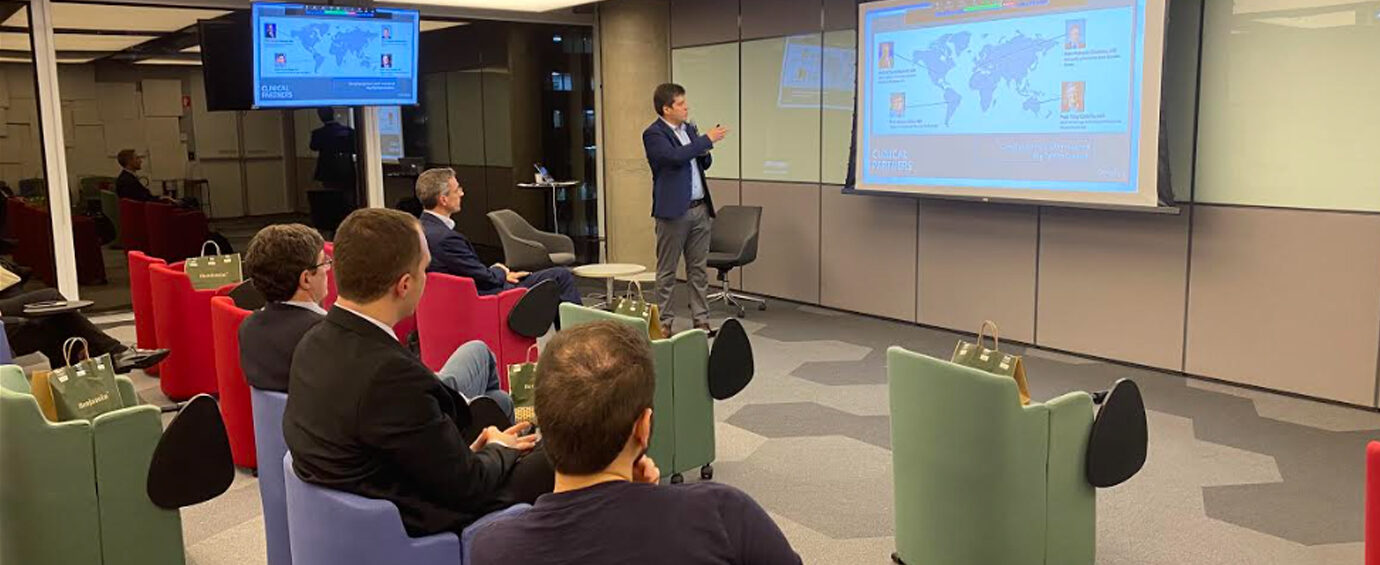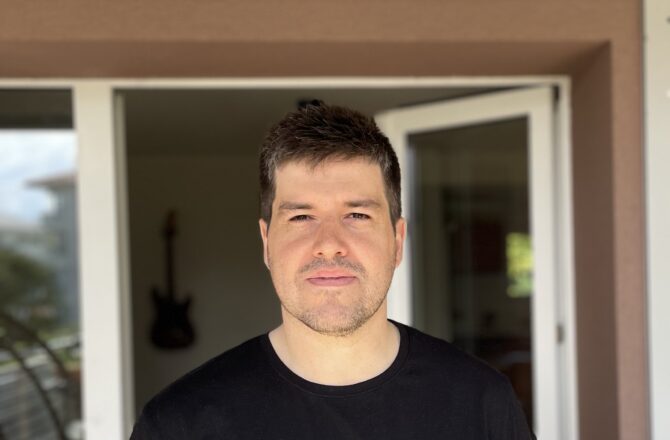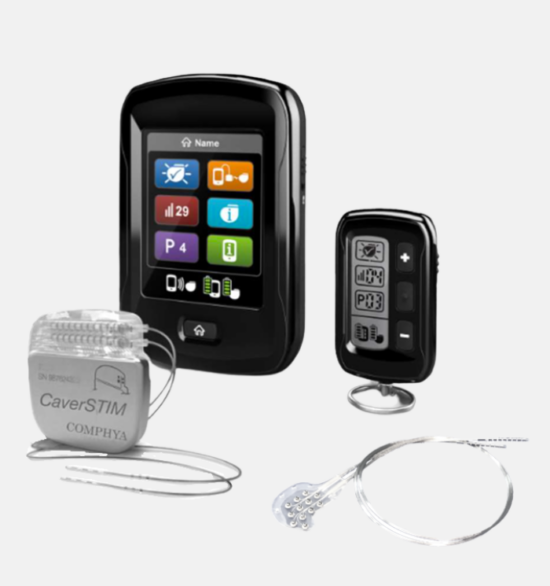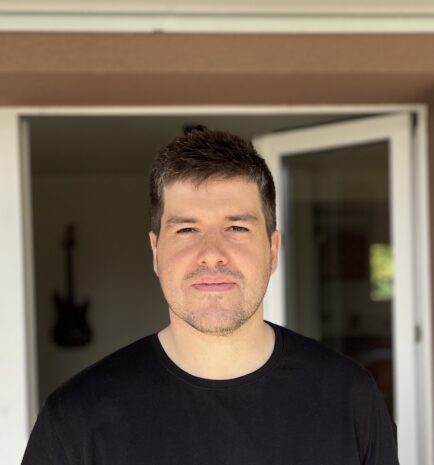
– By Sofia Costa, Communications Manager
Erectile dysfunction (ED) is the persistent inability to achieve or maintain a penile erection. Nearly 30% of ED patients do not respond to oral treatments, for instance, spinal cord injury (SCI) and prostatectomy patients, which commonly resort to painful and problematic intrapenile injections or penile implants. Comphya patented technology is based on a novel implantable device able to restore natural penile erection by neuromodulation. The device will provide self-controlled stimulation (via a wireless remote control) to the cavernous nerve to restore natural erectile function. It will provide a painless, safer, easier, comfortable, and more effective alternative.
Rodrigo is the CEO of Comphya and came to Brazil after eleven years of living in Switzerland to learn how to navigate the Brazilian market supported by Swissnex in Brazil through the Innosuisse Internationalization Camp. Rodrigo tells us a little more about the time spent in Brazil with Swissnex and how it was his experience to meet with possible partners and get to know the innovation, entrepreneurial, and health tech ecosystem.

"Comphya is at the pilot clinical trial in four phases: US and Brazil are the top ones that should come first, then France and Australia."
How did the Innosuisse Internationalization Camp facilitate your first steps in the Brazilian Market?
The first thing is to get access to Brazil’s ecosystem is very difficult. It’s not something easy that you can do from Switzerland to grab a phone and call people. Also, screening for the best partners is complicated.
To give you an idea, we screen about seven consultants to select one good one. Innosuisse allowed this interaction for us to get into the ecosystem and find the best collaboration we could.
We contacted clinical partners and consultants and learned much about the legal and regulatory requirements. It was imperative to put everything in one package with quality. They screened the best people for good interaction. That’s the primary value of the camp.
Why Brazil?
First thing: Brazil is a big market, more than two hundred million people, we could leave it there. And it’s also the first door to go to Latin America.
Brazil also has great scientists with who we exchanged a lot, so we learned a lot from clinicians and urologists. They also had different points of view, which was very valuable for Comphya. They are renowned in Latin America and worldwide, which is crucial for visibility and solidifying our clinical data. That’s also key for a medical device company.
I could keep going why Brazil, but those are the main reasons.
How is the experience of “expectation versus reality” of working in the Brazilian market?
So far, excellent because the expectation and the reality are matching. Everything we plan is ongoing now. We proposed to find a clinical partner for the trial, and it’s running well, so we are working on the protocol, we have already started with the hospital, and everything is going very well. We found the consultants and the CRO to help us with the study. Everything is aligned and moving ahead.
Also, as I said, we learned much in the legal and regulatory parts. Engaging with people will be later, but we had excellent learning, which will be very important for the next phase.
Comphya’s patented technology is based on a novel, implantable device able to restore natural penile erection by neuromodulation.

How is the Clinical Trial Phase going?
We are preparing the dossiê submission because we need authorization from the ethical committee in Anvisa to run the trial. We did the study, and the consultant put together a package and translated the documentation. That’s done. Now, we are doing quality control of the document just before submitting it. We expect to start the trial within three to four months.
What are the next steps for Comphya?
We are ready for the first implantation, but it’s an implantable device with a long path for regulatory approval. We also have to do clinical trials before asking for approval. We are preparing to do a pilot clinical trial in four phases: US and Brazil are the top ones that should come first, then France and Australia.
A significant milestone is the first implantation in a patient, the conclusion of the pilot study, which takes a whole year. We do the implantation and then follow up with the patient for six months. In the second year, we have more clinical trials with people to prove that are no more risks for the patients, and then we apply for market approval.
This bureaucracy and regulatory phase seem very hard from the outside. How is it from the inside?
When I was in Switzerland before going to Brazil, I tried to get feedback from people working in big Brazilian and Latin American companies and medical device companies. They said Anvisa was a strict agency, with many delays and very complicated to go through. People said: “don’t do that. Try something else”. But after going to Brazil and checking with consultants, we realized it is not that difficult.
You only need to understand the local regulations and different paths. People said it would take a year to get authorization to run the trial, but it only takes four months, so it’s a very different timeline.
We’ll figure out later about authorization for the market commercialization, but I know the path already. My point is that I think Swiss companies must go and try to understand each specific case, what exactly the course is, and also find an excellent partner to deal with the regulatory submissions.
We’ll meet Anvisa in the coming weeks to know what’s expected to see. It’s common in the US to meet the agency, align the expectations, and have an opportunity to present what we are doing. Those details become much clearer to understand after going to Brazil.
Comphya is just starting, and the expectation before the camp changed a lot. It’s moving faster.”
What were your impressions during the Camp about the Brazilian innovation, entrepreneurial and health tech ecosystem?
It was great to be with Bianca (Startups & Innovation Manager). She took me to different places and ecosystems. First of all, I was impressed. I didn’t know the Brazilian startup ecosystem was so rich. And I was happy to see the initiatives happening at Inovabra and the Hospital das Clinícas. I was impressed with the quantity and the support they were getting. It was very nice to see so many companies growing.
The second thing that came to my mind that is very important is that this ecosystem is there, and it’s an excellent opportunity for the exchange between Brazil and Switzerland. I think it’s an opportunity to find matches and business exchanges, startups, and possible investors that should be looking beyond Switzerland and Europe, that should be looking to Brazil. Innosuisse may have this task in hand, trying to connect this ecosystem with startups, investors, providers, and the whole ecosystem.
Any final words/considerations about Brazil/partnership with Swissnex?
I’ll say that this partnership was great and fundamental for Comphya to start to work in Brazil. I was glad. First of all, I have to say thanks for the support. It was essential. I don’t think we would have managed to combine all the collaborations in such a short time if we were on our own.
I look forward to continuing this partnership because Comphya will continue in Brazil. We’ll stay in touch since it was so helpful and supportive to Comphya.
Meet Rodrigo
-
![]()
Bio
Rodrigo Fraga-Silva
CEO at ComphyaRodrigo is B.Sc in pharmacy and a Ph.D. in pharmacology. He has over ten years of experience in the scientific space of vascular biology, sexual medicine, and male erection. In the last few years, he published over 50 scientific articles in a prestigious international journal. His scientific work on sexual medicine has been recognized by the International Society of Sexual Medicine with the Jean-Francois Ginestié Prize-2012.
Rodrigo holds seven inventions patented in the field of cardiovascular diseases, erectile dysfunction, and alopecia. One of his inventions has been translated into a topical formulation for hair growth, today, licensed to Yeva Cosmétiques and commercialized as Sanctio®. In the last five years, after inventing the core technology of Comphya with Nikos Stergiopulos, Rodrigo has gathered business skills acting on fundraising, business development, intellectual property, and general management of the company.
